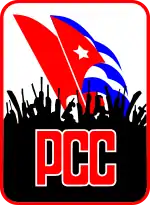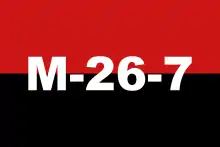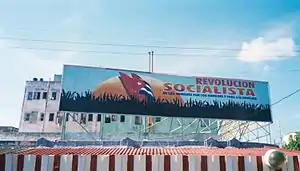Communist Party of Cuba
The Communist Party of Cuba[note 2] is the ruling political party in the Republic of Cuba. The Cuban constitution ascribes the role of the party to be the "leading force of society and of the state". It was founded on 3 October 1965 as a successor of the United Party of the Cuban Socialist Revolution, which was in turn made up of the 26th of July Movement and Popular Socialist Party that seized power in Cuba after the 1959 Cuban Revolution.
Communist Party of Cuba Partido Comunista de Cuba | |
|---|---|
 | |
| First Secretary | Raúl Castro |
| Second Secretary | José Ramón Machado |
| Founder | Fidel Castro |
| Founded | 3 October 1965 |
| Preceded by | United Party of the Cuban Socialist Revolution[note 1] |
| Headquarters | Havana, Cuba |
| Newspaper | Granma |
| Youth wing | Young Communist League |
| Pioneer wing | José Martí Pioneer Organization |
| Membership (2016) | |
| Ideology | Communism[2][3][4] Marxism–Leninism Castroism Guevarism Left-wing nationalism |
| Political position | Left-wing[5] to far-left[6] |
| Regional affiliation | COPPPAL Foro de São Paulo |
| International affiliation | IMCWP ICS (inactive) |
| Colors | Red Blue |
| Slogan | ¡Hasta la victoria siempre! (Until our victory, always!) |
| National Assembly[7] | 605 / 605 |
| Party flag | |
 | |
| Website | |
| www.pcc.cu | |
The PCC is a communist party based on democratic centralism, a principle conceived by Russian Marxist Vladimir Lenin, entails democratic and open discussion of policy issues within the party, followed by the requirement of total unity in upholding the agreed policies. The highest body within the PCC is the Party Congress, which convened every five years. When the Congress was not in session, the Central Committee was the highest body. Because the Central Committee met twice a year, most day-to-day duties and responsibilities are vested in the Politburo. Since April 2011, the First Secretary of the Central Committee has been Raúl Castro, younger brother of the previous First Secretary Fidel Castro, who died on 25 November 2016. The Second Secretary has been José Ramón Machado Ventura.[8]
After taking power in Cuba in 1959, the party began gradually to introduce Marxism–Leninism, a fusion of the original ideas of German philosopher and economic theorist Karl Marx, and Lenin, guided by Joseph Stalin became formalized as the party's guiding ideology and would remain so to this day. The party pursued state socialism, under which all industries were nationalized, and a command economy was implemented throughout Cuba despite the long-term embargo by the United States. The PCC also supports Castroism and Guevarism and is a member of the International Meeting of Communist and Workers' Parties.
History

Cuba had a number of communist and anarchist organizations from the early period of the Republic (founded in 1902). The original "internationalised" Communist Party of Cuba formed in the 1920s. In 1944, it renamed itself as the Popular Socialist Party for electoral reasons. In July 1961, two years after the successful overthrow of Fulgencio Batista and the creation of a revolutionary government, the Integrated Revolutionary Organizations (ORI) was formed from the merger of:
- Fidel Castro's 26th of July Movement
- The Popular Socialist Party led by Blas Roca
- Parts of the student-based Revolutionary Directory led by Faure Chomón
On 26 March 1962, the ORI became the United Party of the Cuban Socialist Revolution (PURSC), which in turn became the Communist Party of Cuba on 3 October 1965. In Article 5 of the Cuban constitution of 1976, the Communist Party is recognized as "the superior guiding force of society and of the State, that organizes and orients common efforts toward the high goals of the construction of socialism and the advancement toward communist society".[9] All parties, including the Communist Party, are prohibited from publicly advertising their organizations.
For the first fifteen years of its formal existence, the Communist Party was almost completely inactive outside of the Politburo. The 100 person Central Committee rarely met and it was ten years after its founding that the first regular party Congress was held. In 1969, membership of the party was only 55,000 or 0.7% of the population, making the PCC the smallest ruling communist party in the world. In the 1970s, the party's apparatus began to develop. By the time of the first party Congress in 1975, the party had grown to just over two hundred thousand members, the Central Committee was meeting regularly and provided the organizational apparatus giving the party the leading role in society that ruling Communist parties generally hold. By 1980, the party had grown to over 430,000 members and it grew further to 520,000 by 1985. Apparatuses of the party had grown to ensure that its leading cadres were appointed to key government positions.
Congresses
The Communist Party of Cuba held its first party Congress in 1975 and has had additional congresses in 1980, 1986, 1991, 1997 and 2011. The Seventh Congress took place from 19 to 22 April 2016,[10] around the 55th anniversary of the Bay of Pigs Invasion,[11] concluding with remarks by Fidel Castro.[12]
The Eighth Congress is scheduled to take place 16 to 19 April 2021.[13]
Central Committee
See also: List of members of the Central Committee of the Communist Party of Cuba

The leading bodies of the party were the Politburo and the Secretariat until 1991 when the two bodies were merged into an expanded Politburo with over twenty members. However, the Secretariat was re-introduced in 2002. There is also a Central Committee which meets between party congresses. At the Fifth Congress, the size of the Central Committee was reduced to 150 members from the previous membership of 225. Fidel Castro was the party's First Secretary (or leader) since its inception while Raúl Castro was the Second Secretary. Upon Fidel Castro's 2008 resignation from the party and Cuban government, Raúl Castro became First Secretary.
Politburo
The 7th Politburo of the Central Committee of the Communist Party of Cuba was elected by the Central Committee on 19 April 2016 following the 7th Congress.
| Rank | Name (birth–death) |
Member since | Duration | Party position(s) | State position(s) |
|---|---|---|---|---|---|
| 1 | Raúl Castro Ruz (born 1931) |
3 October 1965 | 55 years, 125 days |
|
|
| 2 | José Ramón Machado Ventura (born 1930) |
3 October 1965 | 55 years, 125 days |
|
|
| 5 | Miguel Díaz-Canel (born 1960) |
10 October 1997 | 23 years, 118 days |
| |
| 4 | Esteban Lazo Hernandez (born 1944) |
7 February 1986 | 34 years, 218 days |
| |
| 3 | Ramiro Valdés Menéndez (born 1932) |
3 October 1965 | 55 years, 125 days |
| |
| 6 | Leopoldo Cintra Frías (born 1941) |
14 October 1991 | 29 years, 114 days |
| |
| 7 | Alvaro Lopez Miera (born 1943) |
10 October 1997 | 23 years, 118 days |
| |
| 8 | Ramón Espinosa Martín (born 1939) |
10 October 1997 | 23 years, 118 days |
| |
| 9 | Lázara Mercedes López Acea (born 1964) |
19 April 2011 | 9 years, 292 days |
|
|
| 10 | Salvador Valdés Mesa | 10 October 1997 | 23 years, 118 days |
| |
| 11 | Marino Alberto Murillo Jorge (born 1961) |
19 April 2011 | 9 years, 292 days |
| |
| 12 | Bruno Rodríguez Parrilla (born 1958) |
11 December 2012 | 8 years, 55 days | ||
| 13 | Ulises Guilarte de Nacimiento |
19 April 2016 | 4 years, 292 days |
| |
| 14 | Roberto Morales Ojeda |
19 April 2016 | 4 years, 292 days |
| |
| 15 | Teresa Amarelle Boué |
19 April 2016 | 4 years, 292 days |
| |
| 16 | Miriam Nicado García |
19 April 2016 | 4 years, 292 days |
| |
| 17 | Marta Ayala Ávila |
19 April 2016 | 4 years, 292 days |
|
Secretariat
The 6th Secretariat of the Central Committee of the Communist Party of Cuba was elected by the Central Committee on 19 April 2011 following the 6th Congress.
| Rank | Name (birth–death) |
Member since | Duration | Party position(s) | State position(s) |
|---|---|---|---|---|---|
| 1 | José Ramón Machado Ventura (born 1930) |
1 July 2006 | 14 years, 219 days |
|
|
| 2 | Abelardo Álbarez Gil (born 1945) |
1 July 2006 | 14 years, 219 days |
| |
| 3 | Olga Lidia Tapia Iglesias (born 1962) |
1 July 2006 | 14 years, 219 days | ||
| 4 | Víctor Fidel Gaute López (born 1960) |
1 July 2006 | 14 years, 219 days | ||
| 5 | José Ramón Balaguer Cabrera (born 1932) |
19 April 2011 | 9 years, 292 days |
|
|
| 6 | Omar Fernando Ruiz Martín (born 1963) |
17 May 2013 | 7 years, 264 days | ||
| 7 | Jorge Cuevas Ramos (born 1962) |
5 July 2013 | 7 years, 215 days |
Mass organizations, related to the PCC
Young Communist League, (UJC founded in 1962 by Fidel Castro), youth group of future militants of the PCC
Workers' Central Union of Cuba, (CTC, founded in 1939 by Blas Roca and Lázaro Peña), a Cuban trade union center.
Federation of Cuban Women, (FMC, founded in 1960 by Fidel Castro and Vilma Espín), a centralized women's organization.
National Association of Small Farmers, (ANAP, founded in 1961 by Fidel Castro), a peasant organization.
José Martí Pioneer Organization, (OPJM, founded in 1977 by Fidel Castro), student organization (pioneers).
Student Federation of Secondary Education,(FEEM, founded in 1970 by Fidel Castro), student organization (pre).
University Student Federation, (FEU, founded in 1922 by Julio Antonio Mella), student organization (university).
Committees for the Defense of the Revolution, (CDR, founded in 1960 by Fidel Castro), community work organization.
Association of Combatants of the Cuban Revolution, (ACRC, founded in 1993 by Fidel Castro), organization of active and retired military personnel.
Youth
The Communist Party of Cuba has a youth wing, the Young Communist League (Unión de Jóvenes Comunistas, UJC) which is a member organization of the World Federation of Democratic Youth. It also has a children's group, the José Martí Pioneer Organization.
Ideology
Compared with other ruling Communist Parties, such as in Vietnam, China, and Laos, the Communist Party of Cuba retains a stricter adherence to the tradition of Marxism–Leninism and the traditional Soviet model. The party has been more reluctant in engaging in market reforms, though it has been forced to accept some market measures in its economy due to the dissolution of the Soviet Union and the resultant loss of economic subsidies. The Communist Party of Cuba has often pursued an interventionist foreign policy, actively assisting left-wing revolutionary movements and governments abroad, including the ELN in Colombia, the FMLN in El Salvador, the Sandinistas in Nicaragua, and Maurice Bishop's New Jewel Movement in Grenada. The party's most significant international role was in the civil war in Angola, where Cuba directed a joint Angolan/Soviet/Cuban force in the Battle of Cuito Cuanavale.[14][15] More recently, the party has sought to support Pink Tide leaders across Latin America, such as Hugo Chávez and later Nicolás Maduro in Venezuela and Evo Morales in Bolivia. Since the Cuban Revolution, the party has also followed the doctrines of Castroism (the ideology of Fidel Castro, including some elements of social conservatism and inspiration from José Martí) and Guevarism.
Medical diplomacy has also been a prominent feature of the Party's foreign policy. The party maintains a policy of sending thousands of Cuban doctors, agricultural technicians, and other professionals to other countries throughout the developing world.
Raúl Castro, since becoming the leader of the party, has campaigned to "renew" Cuba's socialist economy through incorporating new exchange and distribution systems that have been traditionally seen as "market" oriented. This has led to some speculation that Cuba may transition towards a model more similar to that of China and that of Vietnam.[16]
Electoral history
National Assembly elections
| Election | Party leader | Votes | % | Seats | +/– | Position | Government | |
|---|---|---|---|---|---|---|---|---|
| 1976 | Fidel Castro | Elected by the Municipal Assemblies | 489 / 489 |
Sole legal party | ||||
| 1981 | Elected by the Municipal Assemblies | 499 / 499 |
Sole legal party | |||||
| 1986 | Elected by the Municipal Assemblies | 510 / 510 |
Sole legal party | |||||
| 1993 | Full list | 6,939,894 | 95.1% | 589 / 589 |
Sole legal party | |||
| Selective vote | 360,735 | 4.9% | ||||||
| 1998 | Full list | 7,533,222 | 100% | 601 / 601 |
Sole legal party | |||
| Selective vote | ||||||||
| 2003 | 609 / 609 |
Sole legal party | ||||||
| 2008 | Full list | 7,125,752 | 91% | 614 / 614 |
Sole legal party | |||
| Selective vote | 713,606 | 9% | ||||||
| 2013 | Raúl Castro | Full list | 6,031,215 | 81.30% | 612 / 612 |
Sole legal party | ||
| Selective vote | 1,387,307 | 18.70% | ||||||
| 2018 | Full list | 5,620,713 | 80.44% | 605 / 605 |
Sole legal party | |||
| Selective vote | 1,366,328 | 19.56% | ||||||
See also
Notes
- In turn made up of the 26th of July Movement and Popular Socialist Party
- Spanish: Partido Comunista de Cuba (PCC)
References
- Citations
- "7th PCC Congress Central Report, presented by First Secretary Raúl Castro Ruz". en.cubadebate.cu. Retrieved 21 September 2017.
- "Cuba's New Constitution explained". 27 February 2019. Retrieved 23 May 2020.
- "The Cuban Communist Party at the Center of Political and Economic Reform: Current Status and Future Reform". 30 July 2014. Retrieved 23 May 2020.
- "The Cuban Communist Party: Current Status and Future Reform". 30 November 2014. Retrieved 23 May 2020.
- Víctor Jeifets y Lazar Jeifets (2017). "El encuentro de la izquierda cubana con la Revolución Rusa: el Partido Comunista y la Comintern" (in Spanish). Retrieved 9 January 2017.
- (in French) Parti communiste de Cuba (extrême gauche) (créé en 1965, seul parti légal), Le Monde diplomatique
- "IPU PARLINE database: CUBA (Asamblea nacional del Poder popular), Last elections". ipu.org. Inter-Parliamentary Union. 2013. Retrieved 20 March 2015.
- Shasta Darlington (19 April 2011). "Raul Castro to lead Cuba's Communist Party". CNN. Retrieved 23 April 2018.
- "Cuba: Constitución". pdba.georgetown.edu. Retrieved 14 October 2017.
- "Cuba's Communist Party Congress wants change, but also more of the same". Miami Herald. Retrieved 14 October 2017.
- "Escambray". Escambray. Retrieved 14 October 2017.
- Carroll, Rory (19 April 2016). "Fidel Castro bids farewell to Cuba's Communist party congress". The Guardian. Retrieved 14 October 2017.
- http://en.granma.cu/cuba/2019-12-20/led-by-raul-the-11th-plenum-of-the-communist-party-central-committee-held
- Michael Evans. "Secret Cuban Documents on History of Africa Involvement". Gwu.edu. Retrieved 13 January 2010.
- "Cuba: Angolan War Memories Live On". 16 June 2007. Archived from the original on 16 June 2007. Retrieved 23 April 2018.
- 古巴改革:"社会主义更新"未完待续 (in Chinese). Archived from the original on 29 April 2014. Retrieved 22 April 2014.
Further reading
- Barry Carr. Tim Rees and Andrew Thorpe (eds.). "From Caribbean Backwater to Revolutionary Opportunity: Cuba's Evolving Relationship with the Comintern, 1925-34". International Communism and the Communist International, 1919-43. Manchester. Manchester University Press. 1998.
- "First Congress of the Communist Party of Cuba: Havana, December 17-22, 1975 (Collection of Documents)".
- Fidel Castro. "Main Report, Second Congress of the Communist Party of Cuba" (December 1980).
External links
| Wikimedia Commons has media related to Communist Party of Cuba. |
- Official website (in Spanish)
